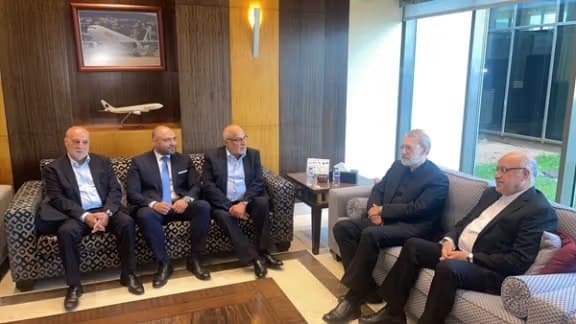Iran"s Larijani Urges Lebanon to Reconsider Hezbollah Disarmament at Urgent Meeting
In a critical diplomatic overture, Ali Larijani, the Secretary of Iran"s Supreme National Security Council, has arrived at Baabda Palace in Beirut for a meeting with Lebanese President Joseph Aoun. This visit comes in the wake of escalating tensions surrounding recent remarks made by Iran"s Foreign Minister, Hossein Amir-Abdollahian, who criticized Lebanon"s intentions to disarm Hezbollah, the Iran-backed militant group that has played a significant role in Lebanese politics and regional conflicts.
Background & Context
The backdrop of this meeting is marked by Lebanon"s ongoing struggle with its internal security dynamics and the influence of Hezbollah, which has been a powerful force in Lebanese society since its inception in the 1980s. The group has been pivotal in various military confrontations, particularly with Israel, and has garnered substantial support from Iran. However, as Lebanon grapples with a severe economic crisis and a fractured political landscape, calls for disarming Hezbollah have gained traction among certain factions and civil society groups.
Amir-Abdollahian"s recent comments exacerbated tensions, as they were perceived as an infringement on Lebanon"s sovereignty. He emphasized the need for a united front against external threats, implicitly warning against disarming the group that Iran views as a crucial ally. This rhetoric has ignited backlash within Lebanon, where many view Hezbollah"s disarmament as essential for national stability.
Key Developments
During the meeting at Baabda Palace, Larijani"s agenda was clear: to persuade President Aoun and other Lebanese leaders to reconsider their stance on Hezbollah"s disarmament. Sources close to the discussions indicate that Larijani emphasized the importance of maintaining Hezbollah"s military capabilities as a deterrent against perceived threats from Israel and other regional adversaries. "Disarming Hezbollah would only serve to empower our common enemies," Larijani reportedly stated during the talks.
The meeting is particularly significant given the current geopolitical climate, where Iran is seeking to reinforce its alliances amidst increasing tensions with the West, particularly concerning its nuclear program and regional influence. The dialogue between Larijani and Aoun is seen as a pivotal moment in determining Lebanon"s future trajectory in the face of external pressures and internal strife.
Broader Impact
The implications of this meeting extend beyond Lebanon"s borders. Iran"s unwavering support for Hezbollah has drawn criticism from various international actors, particularly the United States and Israel, who view the group as a terrorist organization. This ongoing support complicates diplomatic efforts to stabilize not only Lebanon but the broader Middle East region, where sectarian and political tensions continue to simmer.
Experts suggest that Lebanon"s response to Larijani"s overtures could set a precedent for how other nations deal with Iranian influence in their own territories. As previously reported, similar situations have unfolded in neighboring countries, where Iran"s involvement has led to complex security dilemmas, as seen in recent developments regarding Libyan Tuareg forces in Mali.
What"s Next
As the situation unfolds, the Lebanese government faces a critical decision. Will it align more closely with Iranian interests, or will it seek to assert its sovereignty by addressing the Hezbollah issue head-on? The outcome of this meeting could influence Lebanon"s political landscape for years to come, particularly as the nation approaches upcoming elections that could reshape its leadership and policies.
Additionally, the international community is likely to keep a close eye on developments in Beirut. The U.S. and its allies may respond with renewed diplomatic efforts or sanctions should Lebanon"s government appear to strengthen ties with Tehran. With Hezbollah"s role in the region constantly evolving, the coming weeks and months will be crucial for both Lebanese and Iranian policymakers as they navigate this complex web of alliances and enmities.


![[Video] Heavy clashes and gunfire reported in Baghdad, Iraq](/_next/image?url=%2Fapi%2Fimage%2Fthumbnails%2Fthumbnail-1768342239932-848qsh-thumbnail.jpg&w=3840&q=75)




![[Video] Gunfire between Iraqi security forces and Sadr militias in Baghdad](/_next/image?url=%2Fapi%2Fimage%2Fthumbnails%2Fthumbnail-1768343508874-4redb-thumbnail.jpg&w=3840&q=75)
